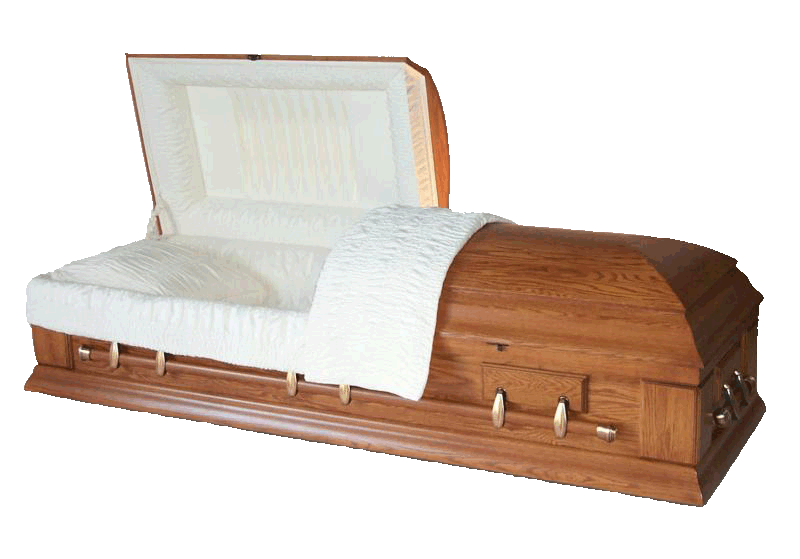Believers often rely on their faith during hardship. As Psalm 9:9 tells us, “The LORD also will be a refuge for the oppressed, a refuge in times of trouble.”
Religion seems especially prominent during funerals. Most funeral ceremonies consist of ten percent praise for the deceased and ninety percent praise for the deceased’s religion.
This fact assures me that my own funeral will be very brief. Whoever presides over my funeral will say, “Well, he was a decent fellow, I suppose, give or take a few incidents. He’s dead now, though. Yeah, he’s definitely dead. Okay, so, I guess that’s it. Drive safely.”
To the believer, the death of a loved one marks the beginning of a period of separation, after which they will be reunited in heaven. But for the atheist, the death of a loved one marks a permanent separation. It sounds as though atheists have more reason to boo-hoo at funerals.
But maybe not. According to Luke 13:23-24, “And someone said to him, ‘Lord, will those who are saved be few?’ And he said to them, ‘Strive to enter through the narrow door. For many, I tell you, will seek to enter and will not be able.’”
This passage suggests that most people are going to hell, or at least that they are not going to heaven. If most people aren’t going to heaven, then the atheists’ notion of a permanent separation at death may actually be preferable to eternal life.
How much comfort can the believer derive from the prospect of being united with loved ones in hell? The day you look over and see your mother screaming and twisting in the fires of hell is probably not going to be a happy reunion. If it is, your family may have been a smidge dysfunctional.
Only a third of Americans believe that hell is the kind of physical place where souls can be reunited. A Barna Group survey indicates that less than one half of one percent of believers expect to go to hell. In contrast, the Christian author David J. Stewart contends that about 200,000 people go to hell each day. Christians seem to be divided on the issue of hell.
I can imagine a conversation between a believer and an atheist going something like this:
Believer: “I don’t see how you can cope with the death of a loved one if you don’t believe you’ll ever see that loved one again in heaven.”
Atheist: “My difficulties in coping with the death of a loved one don’t prove your religion is true.”
Believer: “I agree. I’m not saying that my belief is correct because it provides consolation in the face of a loved one’s death. I am merely saying that my belief gives me consolation, and I am wondering where you manage to get consolation.”
Atheist: “Your belief gives you consolation? Is that all? Why not sheer joy? If I knew that someone I loved went to heaven, a place of endless bliss, I would not be merely consoled. I’d be ecstatic. You literally could not wish for a better outcome for your loved one. It’s the best thing that could possibly happen. Instead of sitting there in the funeral home dabbing away tears, why aren’t you dancing in the street?”
Believer: “Anyone who loses a loved one will, of course, feel sorrow because they will miss the departed person. We’re happy for that person, but sad for ourselves.”
Atheist: “I’ve seen how believing parents mourn the loss of a child. The pain they endure is deeper than what they would feel if they expected merely to spend a few years missing their child. They mourn as though they believed that the child was simply gone—and not gone for a few years, but gone permanently. They mourn like atheists.”
I am not sure how we could resolve such a dispute, given that we cannot quantify parental grief to measure which model it better fits. But it seems to me that we’re all subject to much the same level of pain.
The belief in heaven may have some ability to console people when they contemplate the prospect of death, but it does not appear to help much when people confront the real thing. It’s like a rotten seatbelt. As long as we don’t recognize that it’s rotten, we feel protected by it. But when the emergency arrives, it inevitably fails. Even if the rotten seatbelt mitigates the impact, its influence is minimal. Death is a tragedy, and no theological ruminations are ever going to change that.
October 27, 2002, was the saddest day of my life. That was the day the doctors told my wife and me that our son probably had two months to live and that we should focus on enjoying our limited time together. That evening my wife and I went to bed early and held each other as tightly as we could and bawled. This is how an atheist parent and a Christian parent handled the same situation. No philosophy, no religion, nothing in heaven or Earth could take away that pain. We were helpless. We simply clung to the only person on the planet who knew exactly how we felt.
We were lucky in that the predicted outcome was diverted, some say through a miracle and some say through an experimental surgery and new medicines.
In times of misery and times of joy, all of us, believers and nonbelievers alike, are subject to similar emotions. The strength we have is the strength we offer one another. Love is more powerful than any religion or ideology.

